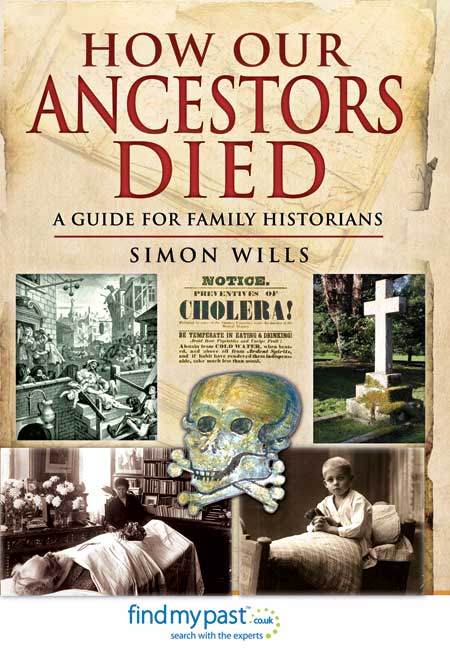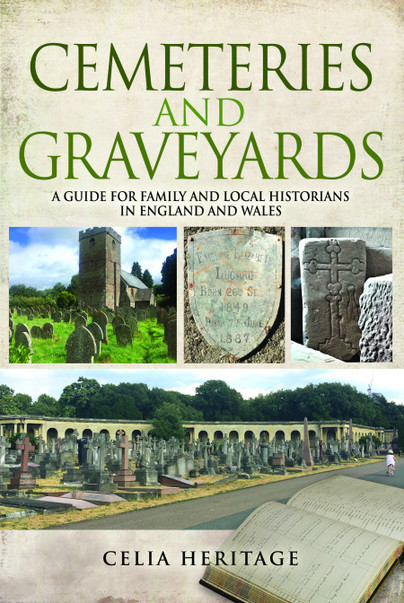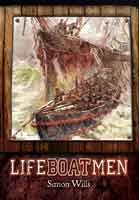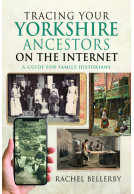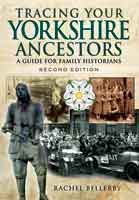How Our Ancestors Died (Paperback)
A Guide for Family Historians
Imprint: Pen & Sword Family History
Pages: 224
Illustrations: 40 black and white images
ISBN: 9781781590386
Published: 4th April 2013
Last Released: 11th March 2022
(click here for international delivery rates)
Order within the next 11 hours, 33 minutes to get your order processed the next working day!
Need a currency converter? Check XE.com for live rates
| Other formats available | Price |
|---|---|
| How Our Ancestors Died ePub (3.8 MB) Add to Basket | £6.99 |
What were the principal causes of death in the past? Could your ancestor have been affected? How was disease investigated and treated, and what did our ancestors think about the illnesses and the accidents that might befall them? Simon Wills's fascinating survey of the diseases that had an impact on their lives seeks to answer these questions. His graphic, detailed account offers an unusual and informative view of the threats that our ancestors lived with and died of.
He describes the common causes of death - cancer, cholera, dysentery, influenza, malaria, scurvy, smallpox, stroke, tuberculosis, typhus, yellow fever, venereal disease and the afflictions of old age. Alcoholism is included, as are childbirth and childhood infections, heart disease, mental illness and dementia. Accidents feature prominently – road and rail accidents, accidents at work – and death through addiction and abuse is covered as well as death through violence and war.
Simon Wills's work gives a vivid picture of the hazards our ancestors faced and their understanding of them. It also reveals how life and death have changed over the centuries, how medical science has advanced so that some once-mortal illnesses are now curable while others are just as deadly now as they were then.
In addition to describing causes of death and setting them in the context of the times, his book shows readers how to find and interpret patient records, death certificates and other documents in order to gain an accurate impression of how their ancestors died.
I loved this book. It is very informative, the writing style is easy to read and the book flows well. I enjoyed it from the first page until the last one.
NetGalley, Edita Pil
This is a thorough and well-done guide to common, and not so common, causes of death in the past, particularly in the British Isles. It’s good for genealogical research or for those simply interested in the subject. I’ll add in here that I seem to have a rather large number of ancestors who were beheaded. You never know what you’ll find when researching your ancestors!
NetGalley, Morris Morgan
As featured in
Family Tree September 2021 Edition
Featured in
Who Do You Think You Are? Magazine - Issue 180, Summer 2021
How Our Ancestors Died is an informative read for those interested in genealogy and/or the history of diseases.
NetGalley, Katie Eife
While I don´t live in the UK (or have ancestors from there) it still gave me some great tips for my own research.
Layman-accessible and interesting read!
Rating: 5 out of 5 stars
NetGalley, Kendra Carter
I was quickly sucked into this book. It was a very interesting read and covered a wide variety of possible causes of death. Dr. Wills’ writing was easy to follow, yet very detailed and thorough. I appreciate that he explained how causes of death changed over time as well as made connections with the impact of medical science. However, I would say the greatest contribution of this book is that Dr. Wills provides instruction on how to find and interpret patient records/documents. I look forward to future works by this author.
Simon's guide explores the many causes of death that our forebears faced, and the treatments they received.
WDYTYA? Magazine July 21
This is a science book about epidemiology of deaths in older Times. It describes how different people died in past. It clearly shows with time pattern of disease have changed. Infections were more common. So we're nutritional deficiencies. It is very engaging book with detailed explanation of circumstances and symptoms of diseases.
NetGalley, Amit Verma
An excellent resource for genealogists everywhere, not just in the United Kingdom. Understanding how diseases and death were handled in past decades and generations exponentially expands the coherency of historical records.
NetGalley, Kathleen Nelson
I was intrigued by the title of this book because I love history and do quite a bit of ancestry research. As the genealogist for my family, I have had the opportunity to trace my family line back to the 1600's. I have quite a bit of information on where they lived, what jobs they had, number of children raised, but next to nothing about how they died (many at a very young age). In many cases, the death certificates that I was able to obtain, did not list a cause of death. I was able to take the information in the book and piece together what diseases and treatments (or lack of) were available at a certain time in history and surmise how some of my ancestors may have died. Dr. Wills did a fabulous job of explaining the prevalence of certain diseases, how doctors thought they were doing good by their patients (and explaining how some doctors knew they were practicing quackery), and the survival rates for various maladies in different eras of history. And, considering that most of the history presented in the book mainly dealt with England, and that is where my family is from, made this book an even more fascinating read. By the end of the book, I had a true appreciation for the extremely hard lives that our ancestors lived and a gratefulness that I live in the century that I do now!
NetGalley, SHANNON KRAUS
Rating: 5 out of 5 stars
NetGalley, Deborah White
"How Our Ancestors Died" explains how to find out how your British ancestors died and what the various medical terms mean. The focus seemed mostly on the late 1700s to modern day, though he did comment on occurrences (of plague, etc.) further back in history. The author started by explaining the basic medical practices of the time and how to find death reports. He then talked about specific, common ways that people died, including basic information about the disease or examples of common fatal accidents as well as explaining the words that were used to describe that disease at the time. He covered accidents, childhood diseases, cholera, chest infections, bowel infections, influenza, plague, smallpox, tropical diseases, tuberculosis, typhus, venereal disease, heart problems, epilepsy, stroke, war, wounds, childbirth, suicide, scurvy, execution, murder, starvation, food poisoning, other poisoning, and more. He also talked about historical problems like dietary deficiencies, alcoholism, mental illness, pregnancy, etc. This book contained useful information on finding out how your ancestors died: both where to look for documentation and for understanding what's on the documents.
Interesting account of the history of diseases and causes of death and how it ties in to genealogy. I found it particularly fascinating as I work in the field of medical information.
NetGalley, Melanie Thomson
Rating: 5 out of 5 stars
NetGalley, Emy Girard
This was a very interesting take on a side of history we usually just briefly talk about. I found it very informative and full of new information (to me, at least). I definitely recommend this book to fans of history who want to dive deeper.
Rating: 5 out of 5 stars
NetGalley, Alison Bevington
I eagerly look forward to any new Pen and Sword publications as I know how beneficial they have been to my family history research. I’ve found previous books by Dr Simon Wills very useful.
Even as someone who has been compiling their family tree for a while now I seem to find something of use in every new publication .
A very interesting and informative read which I’m sure will continue to be of use when I’m looking into the lives of my ancestors.
As someone who has done a lot of genealogy research, I really appreciated the tips this book gave! Not only would it be helpful in deciphering outdated reasons listed as "cause of death" on a death certificate, it also points you to where you could find death information on your English ancestor. This is especially helpful for a genealogist from another country who is not familiar with the different British agencies that would possibly have information regarding your ancestors. A good resource to add to your genealogy shelf.
NetGalley, Amy Albers
Rating: 5 out of 5 stars
NetGalley, Monica Mac
A really interesting and informative book about diseases and causes of death in previous generations. A particularly good source of information for family history buffs!
I came across this book after doing a bit of my own family research. I knew that my grandmother had had 6 children, but only 2 of them survived toddlerhood. As I found one baby born 2 years after my father (and their local paper just had a list of women who had had babies that particular week and next to their names, either S for son or D for daughter), I noticed a column dedicated to that weeks deaths. There were the usual older people but what struck me was how very many babies and toddlers were listed. It was so sad. So, I started to wonder what on earth all these babies died from? And this book has given me a good idea. In fact, it is surprising to me that there were enough ancestors and their offspring who made it through to adulthood that our family continued at all - there were so many diseases to kill us along the way! Even my own father had a bout of TB when he was around 12 (caught from his clarinet teacher by sharing a mouthpiece), yikes.
The book is in alphabetical order and it gives insight as to what diseases plagued our ancestors, and the alternate names for them, if you are looking up death certificates and the like. As a nurse, I found the whole thing fascinating and Dr Wills has done a fantastic job of describing what everyday life was like for our ancestors, in easy to understand language. I am eternally grateful to be living now, with antibiotics and vaccines etc.
5 stars from me.
I found this book extremely informative and also really entertaining. A lot of information that I didn't know before. I highly recommend.
NetGalley, Blind Bat Books Bakunzi
Rating: 5 out of 5 stars
NetGalley, Anne Marshall
How Our Ancestors Died by Dr Simon Willis is a thorough look at not only diseases of the day, but potential treatments, causes, and the general culture surrounding illnesses. It is not so much a book to sit and read, although it is readable enough, as it is a reference work for varying time periods for use by a historian, a genealogist, or a writer. It appears to be well-researched and accurate. There is a thorough bibliography attached as well. This is a go-to book for people who require this information in a concise, readable format.
Rating: 5 out of 5 stars
NetGalley, Stephen Goldberg
I enjoyed this book. The book makes the history of medicine come alive through the use of vignettes, obituaries, press clippings, and art/photos. I also appreciated the author’s use of family anecdotes. I can see why the book is identified as a guide for family historians, as the book provides a lot of resources for exploring family history, although these apply only to Britain. Indeed, a lot of the material is specific to Britain but there is enough general medical information to be of interest to anyone interested in the history of medicine, of which there is much in the book. One thing I particularly liked was the definition of historical medical terms with more modern names. I recommend this book for anyone interested in the history of medicine.
Rating: 5 out of 5 stars
NetGalley, Catherine Hankins
Fascinating and somewhat entertaining look at what our ancestors' died from. Loved the chapter on smoking and cancer. Makes me laugh to this day that doctors and nurses would smoke when visiting patients. Allergists and ENT's also smoked with visiting patients. To think smoking was considered healthful until about the 1960's! I enjoyed the chapter on alcoholism, too. Now I always knew a beer was an everyday drink for everyone, just not how low an alcohol content it had. That was interesting. I was also surprised to learn most alcoholic beverages were rather low in alcohol until distilleries were created. Who knew? Pregnancy and childbirth were always dreaded by women- babies could kill you. And off course there are all the illnesses, diseases and accident waiting around every corner. In light of the current pandemic, it sort of puts things in perspective I think. Fun and informative book.
Rating: 5 out of 5 stars
NetGalley, Annie Buchanan
I'm a medical professional and I work in pathology. The study of disease is literally my day job. I also happen to be a huge history nerd and my family hail from the British Isles, so this book was a happy confluence of interests for me. I learned quite a lot here and it's no stretch to imagine that the author is a gifted speaker/teacher. His style throughout the book is information rich but not pedantic and he has a rare gift of highlighting salient points without just drowning the reader in less useful information or getting bogged down in minutiae.
The introductory chapters give good background information on the often lacking scientific accuracy of medical care and diagnostics in centuries past. In these chapters the author provides good background info on the normal historical methods of recording information and where and how modern seekers can access the information (and what records are likely to be available and from whom).
The following chapters are arranged by cause of death, roughly alphabetically, and range from Accidents & Disasters to War & Wounds, with pretty much everything else one could imagine in between. The chapters are well supported with attributed quotes (for further reading) and photographs and facsimile documents scattered throughout. The author has also included a short bibliography and cross-referenced index.
This will be a valuable resource for family researchers, readers of history, public & home library acquisition, as well as writers of historical fiction/non-fiction. It's layman accessible and interesting. I read it through cover to cover like a novel.
Five stars.
Author article ‘Netting your ancestors’ as featured by
Family Tree, March 2021
Author article: 'What is DNA?' as featured by
Family Tree, February 2020
Acknowledged at the end of author article 'Tracing Lifeboatmen'
Family Tree, October 2019
Acknowledged at the end of author article 'Tramps, tinkers & travellers'
Family Tree, September 2019
As featured by
Bradway Bugle, Spring 2019
Author article: Researching your ancestors' mental health as featured by
Family Tree, January 2019
As referenced in author bio
Family Tree, October 2018
'Simon Wills learns about a fascinating Scottish family history society project to capture the stories of local convicts over a period of nearly a century'
Family Tree, June 2018
Author article 'Headstone hunter' as featured in
Family Tree, April 2018
Author article as featured in
Family Tree, February 2018
Author article on finding Peterloo roots as featured in
Family Tree, January 2018
Author article on preserving the past online as featured in
Family Tree, January 2018
As featured in part of author article
Family Tree, October 2016
As featured in part of author Q&A
Family Tree - September 2016
As featured in.
Family Tree Magazine August 2016
As featured in.
Family Tree June 2016
As featured in.
Family Tree Magazine May 2016
As featured in...
Family Tree - April 2016
As featured in...
Family Tree - March 2016
Fascinating survey of the diseases. Unusual and informative view of the threats that our ancestors lived with and died of.
Kent Family History Society Journal
A fascinating guide on how to investigate you ancestor's cause of death. His graphic, detailed account offers and unusual and informative view of the threats that our ancestor's lived and died from.
Family Chronicle
A fascinating read. Rather than a morbid subject, of you are interested in social history, this really is a book for you.
West Middlesex Family History Society
A fascinating survey of the causes of death in the past and it will interest family and medical historians.
B&A FHS Journal
This is a fascinating guide to a bygone way of death.
The Guide
At last, a book that helps us to interpret those death certificates with their references of 'griping in the guts,' 'ship fever' or dipsomania.
Who Do You Think You Are?
A Fascinating new book How Our Ancestors Died, by Simon Wills, takes a backward look at the problems, illnesses, and afflictions that dogged earlier generations
Southern Daily Echo
In this fascinating book, well-known genealogy writer and NHS advisor Simon Wills brings his two interests together to explore the most common causes of death and how we can learn about them to illuminate our ancestors' lives. Inevitably, the focus is on the last 200 years, thanks to civil registration providing death certificates with details of the cause of death, but Wills looks back through time at the history of diseases such as the plagues of the past centuries and other issues such as famine. He also shows how parish records, newspapers, legal records and monumental inscriptions can sometimes tell us more.
Your Family Tree
About Dr Simon Wills
Dr SIMON WILLS is a genealogist, historian and journalist and a regular contributor to Family Tree, the BBC’s Who Do You Think You Are? and other magazines. He writes mainly about maritime history and genealogy, but he also has a special interest in health and disease in the past. He has given presentations and interviews all around the UK for history, genealogy and literary festivals, and for organisations such as the BBC, National Trust and National Archives. His most recent publications include a guide to maritime photographs, Tracing Your Seafaring Ancestors, and a popular account of our forebears' illnesses, How Our Ancestors Died.
Cemeteries and Graveyards A Guide for Local and Family Historians in England and Wales (Paperback)
This comprehensive and fascinating guide from genealogist and historian CELIA HERITAGE will prove indispensable for both local and family historians. A wide-ranging examination of historical and archaeological findings means that the book will also appeal to anyone with an interest in death and burial. Celia throws light on changing social attitudes to death and burial from pre-historic times to the modern day, investigates the origins and evolution of cemeteries and graveyards, and discusses the many different types of graves and memorials as well as looking at how memorial designs have changed.…
By Celia HeritageClick here to buy both titles for £30.98







